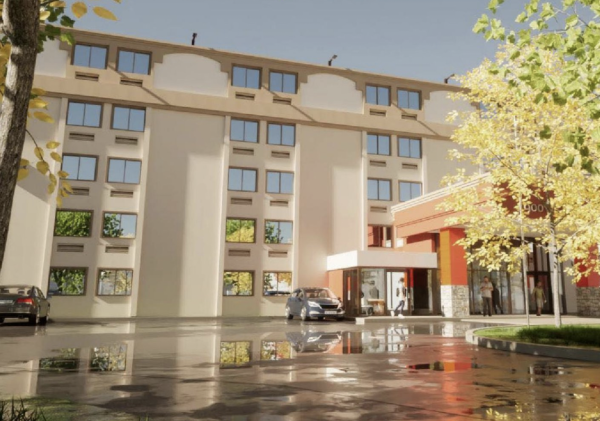May 11, 2023

A rendering of 900 Morrissey once it's converted from a Comfort Inn to permanent supportive housing for formerly homeless people.
The Boston Planning and Development Agency’s board on Thursday unanimously signed off on a proposal to convert the Comfort Inn at 900 Morrissey Blvd. into permanent supportive housing for formerly homeless people.
The controversial project would overhaul the 131-room hotel into 99 units, down from the original proposal calling for 110 units. On-site support staff and round-the-clock security will be on hand.
At multiple meetings hosted by the BPDA and at other gatherings held by local civic associations, residents objected to the proposal, saying they did not want formerly homeless people living in the neighborhood. But other neighbors supported the project, citing the region’s lack of housing supply amid high demand.
After the BPDA’s public comment period ended on Thursday night, Ted Landsmark, one of the development agency’s board members, said he was “very moved” by the comments from supporters.
Landsmark said that even with “very vocal” neighborhood opposition, “it’s clear there’s great community support to address the issue that goes beyond this individual neighborhood and really affects the entire city and region. We all have a responsibility to step forward to support our neighbors and family members who find themselves in this situation and who are trying to access the kind of supports that the proponents in this case have put forward.”
Two nonprofits, Pine Street Inn and The Community Builders, are behind the proposal. The Comfort Inn is surrounded by a Stop & Shop, the Murphy K-8 School, a Dunkin, Extra Space Storage, and Jiffy Lube. The five-story building was first built in 1985.
The two nonprofits committed to offering the units to seniors who are 62 and older. Pine Street manages 850 similar units across the city, and the average age of their residents is 57.
The project is expected to cost $49.2 million, according to a board memo from a BPDA staffer. The project’s funding sources are likely to come from investor equity raised through the sale of federal and state low-income tax credits, and financing from the Mayor’s Office of Housing and the state Department of Housing and Community Development.
The development oversight agency finds that project will “constitute a public use and benefit,” due the renovation of the underused Comfort Inn, the creation of construction jobs and low-income housing, the rebuilding of the Conley Street sidewalk, and the removal of curb cuts on Morrissey Boulevard, according to the BPDA memo.
District 3 Councillor Frank Baker was among the elected officials who logged onto Thursday night’s BPDA board meeting to register their opposition. “I’m standing with my community with this one,” he said, noting neighborhood sentiment against the proposal.
State Sen. Nick Collins, who represents South Boston and Dorchester, asked BPDA board members to table the proposal and instead consider a study on converting US Navy properties into affordable housing.
But Dorchester resident Molly Ryan said tabling would be the wrong move. “Having permanent supportive housing for elders and older adults who need it, that sounds amazing to me,” she said, joining a sizable number of people who spoke in favor of the project before the vote.


